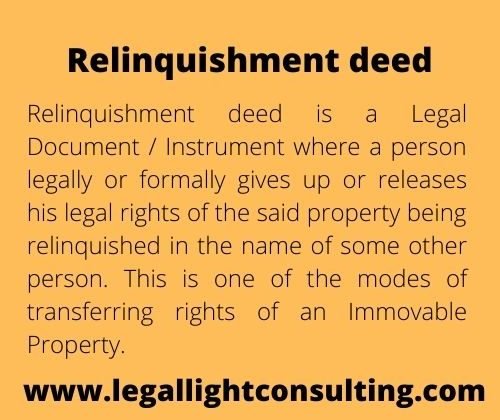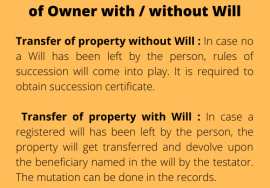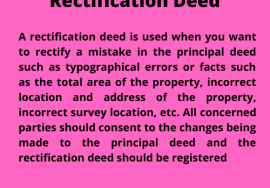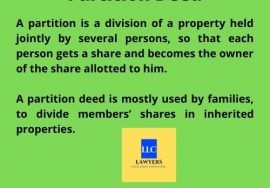
Relinquishment Deed
Relinquishment deed: A relinquishment deed is a Legal Document / Instrument where a person legally or formally gives up or releases his legal rights of the said property being relinquished in the name of some other person.
This is one of the modes of transferring the rights of an Immovable Property.
A relinquishment deed is a mode of transferring the rights of immovable property.
It is a legal document through which the property’s owner formally gives up or releases his/her legal rights over the property. This deed is generally used to transfer the share in the property after the death of a person.
When the owner of a property dies without leaving a will or testimony will, in such cases the property will be inherited by his/her legal heirs, as per the provisions of the Hindu Succession Act, 1956.
A relinquishment deed will be used for sharing the property among the legal heirs and then getting the Mutation done in favour of the legal heirs in MCD, DDA, L & DO’s records.
This deed is required to be registered carefully. It is also subject to close scrutiny by the Sub-Registrar.
Advantage of a Relinquishment Deed: The chief advantage of a relinquishment deed over a gift deed is that it allows the transfer of a jointly held property.
It can also be used for monetary compensation. A relinquishment deed allows seamless transfer if a property is owned jointly.
It is commonly used when a person dies without leaving a will and the legal heirs end up inheriting the property.
A relinquishment deed needs to be drafted carefully.
A relinquishment deed is subject to close scrutiny by the Sub Registrar because it is often used to save the stamp duty payable on a gift deed.
- A Release or a relinquishment deed is irrevocable even if it is made without any consideration. For a valid Relinquishment, the property in question must be owned by more than one person.
- Relinquishment of property cannot be made in favour of a person other than a co-owner. If a Relinquishment is made in favour of a person who is not a co-owner, the transaction shall be treated as a gift and would attract the same stamp duty as applicable to the gift deed/conveyance deed.
- Relinquishment of rights in the immovable property needs to be done only through a written document called Relinquishment Deed which must be signed by all the parties and witnessed by at least two witnesses.
- A release of rights in immovable property should be made only by a registered deed. The registration takes place in the office of the Sub Registrar within whose jurisdiction the property is situated.
- A relinquishment may be made for a consideration (Release Deed) or even without consideration.
- A relinquishment deed is one of the documents which fall under Section 17 of the Registration Act, 1908 and hence it is compulsory to get it registered at the concerned sub-registrar’s office.
- In Telugu Krishna Mohan and Another vs. Smt.Boggula Padmavathi and Others, it has been held that an unregistered relinquishment deed is not admissible in evidence for want of registration under Section 17 of the Indian Registration Act.
- The relinquishment deed can be made in respect of Leasehold properties of DDA, L&DO as well as Freehold properties such as Plots, residential houses, builder floors, apartments, flats, commercial shops, office etc. after the death of the father, mother or other family members.
Relinquishment deed draft templets
- Sale Deed
- Lease Deed / Rent Agreement
- Agreement to Sell
- Gift Deed
- General Power of Attorney (GPA)
- Will
- Release/ Relinquishment Deed
- Other Property Documents








